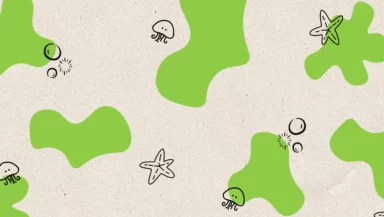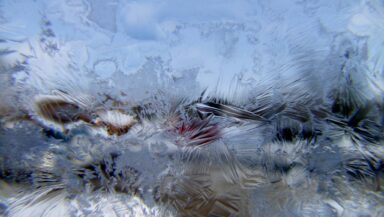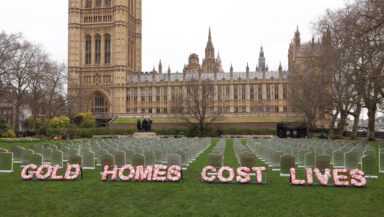Kingston, Jamaica (July 24, 2023)- Video projections featuring civil society leaders from the Pacific region calling for a halt to deep sea mining were seen throughout the weekend in Mexico City, Mexico, Toronto, Canada, Dover, UK, and Kingston, Jamaica. Greenpeace International created these videos while working with these leaders at the International Seabed Authority (ISA) in Kingston to share Indigenous perspectives about the impacts the industry would have on their region’s cultural heritage, food security, and livelihoods.
Images and videos are available here.
UK images and video (projected onto the White Cliffs of Dover) here
Solomon Pili Kahoʻohalahala, a native Hawaiian Elder of the Papahānaumokuākea Marine National Monument Advisory Council and Native Hawaiian Cultural Working Group, said: “The story of our creation begins in the ocean in the deep seas. Our role as humanity is to create balance and to care for all things that precede us, even the coral polyp. We are here at the ISA to discuss our connection to the deep sea and share this perspective so that this can be included in this discussion on launching an industry that will encroach into the place of creation itself. We are here to say no to deep sea mining and no to the destruction of our cultural heritage.”
In March, Kahoʻohalahala and fellow indigenous activist Hinano Murphy delivered a petition to the ISA with over 1,000 signatories from 34 countries and 56 Indigenous groups calling for a total ban on the industry. Scientists warn that if this industry, earmarked for the high seas between Hawaii and Mexico, is allowed to launch, it will cause irreversible and unavoidable harm to vital ocean ecosystems, including biodiversity loss, disruption of carbon storage processes, and noise, light, and sediment pollution.
Joey Tau, the Extractives Campaigner with the Pacific Network on Globalisation (PANG) based in Suva, Fiji, said: “In the Pacific, the ocean is dear to us. It informs our lives and who we are as a people. It has sustained us for many generations. The specter of deep-sea mining raises many concerns that remind us of the legacies our region has felt from other colonial extractive industries and the barbarous nuclear testing era. We call on world leaders to be better stewards of our ocean by joining the call for a precautionary pause or moratorium or taking on the Pacific call of the last decade for a ban on this destructive neo-colonial industry.”
Edwin “Ekolu” Lindsey, co-founder and president of Maui Cultural Lands, said: “The knowledge that there’s a possibility of mining the heart of who we are as a people is painful. We do not have the authority to desecrate what should be untouched and to leave our future generations with nothing. When the fate of humanity is at stake, each of us has the responsibility to step up and stop this. In the battle between nature and corporate greed, nature should win every time.”
The ISA has opened up over 1.5 million km2 – an area four times the size of Germany – for deep sea mining exploration. The contracts are monopolized by a handful of companies headquartered in the Global North. Deep sea mining industry interests such as The Metal Company (TMC) and their subsidiary Nauru Ocean Resource Incorporated (NORI), sponsored by the state of Nauru, have used the two-year loophole to pressure governments to allow deep sea mining to start from this month. Governments have not succumbed to this commercial pressure and have not formally permitted mining to start; however a loophole that allows companies to submit an application to mine remains open.
The Pacific Parliamentarians’ Alliance on Deep Sea Mining (PPADSM), supported by the Federated States of Micronesia, Fiji, Palau, and Samoa, expressed serious concerns about the potentially devastating and irreversible damage to ecosystems and habitats that could result from deep sea mining. They urged action to safeguard the health and future of all ecologies, including humankind and future generations, from unsustainable modes of living and economic development.
The calls for a moratorium have never been louder. Canada, Portugal, Brazil, and Finland became the latest of a group of 21 governments that are trying to put the brakes on this reckless industry. A cross-regional coalition of Chile, France, Palau, and Vanuatu have formally requested that the UN-affiliated body discuss a proposal for pausing this dangerous activity during its Assembly meeting that will be held from July 24 to 28.
ENDS
Notes to the editor:
- Solomon “Uncle Sol” Pili Kahoʻohalahala: is a seventh-generation native Hawaiian descendant, kupaʻāina, from the small Hawaiian island of Lānaʻi. He is the current native Hawaiian Elder of the Papahānaumokuākea Marine National Monument Advisory Council and Native Hawaiian Cultural Working Group. He is the current Chair of the Hawaiian Islands Humpback Whale National Marine Sanctuary and is a Cultural Community Member of the Pacific Remote Islands Marine National Monument. He is a member of the indigenous peoples NGO Kuaʻāina Ulu ʻAuamo (KUA).
- Edwin “Ekolu” Lindsey: Raised on Maui, Ekolu’s parents — Ed Lindsey, a Native Hawaiian and lifelong school teacher, and Puanani Lindsey — co-founded Maui Cultural Lands in 2002. After his father passed away in 2009, Ekolu carried forward his family’s legacy of service and their vision of protecting and restoring Hawaiian cultural resources and the marine environment. Ekolu is the president of Maui Cultural Lands and, in July of 2015, completed a ten-day, 500-mile journey aboard the voyaging canoe Hikianalia to the Papahānaumokuākea Marine National Monument in the Northwestern Hawaiian Islands to conduct reef surveys and fish monitoring to help better manage Hawaii’s marine resources. Ekolu also cofounded Polanui Hiu, the first Community Managed Makai Area (CMMA) on Maui. Ekolu sits on many non-profit boards and donates his time freely to create a better world by serving the present for those not yet born.
- Joey Tau: From Papua New Guinea/Fiji, is the Deputy Coordinator of the Pacific Network on Globalisation (PANG) based in Suva, Fiji. PANG is the region’s alternative voice in defending and promoting Pacific people’s right to economic self-determination, mobilizing and advocating based on substantive research and analysis to challenge neoliberal development agendas in the region. He also coordinates the Pacific Blue Line, a collective of Pacific NGOs, churches, feminist groups, and movements calling for a global ban on deep sea mining.



